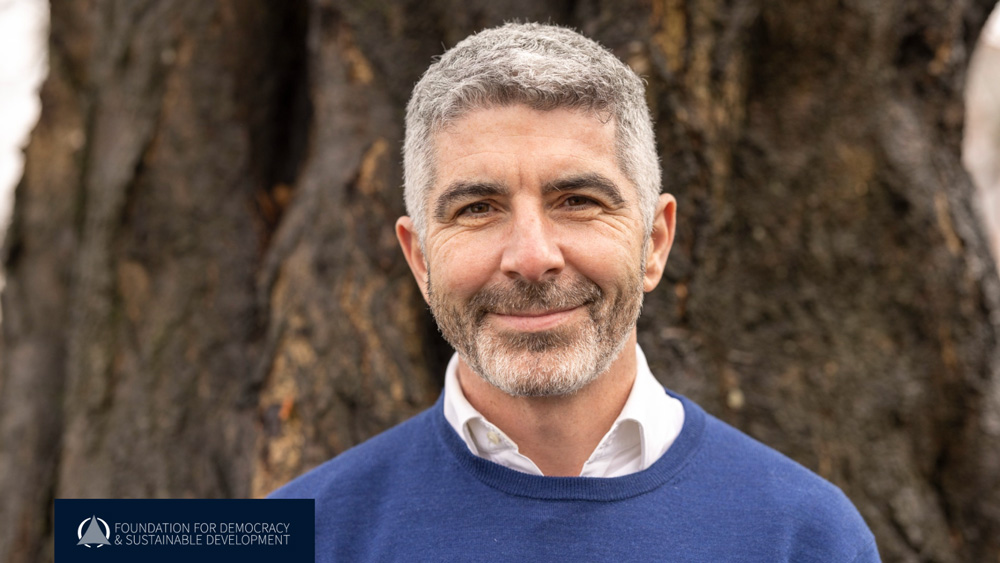
Imgae: Courtesy of Luke Jones/unsplash.com (CC)
This blog is drawing on a conversation between Jennifer Dixon, Chief Executive of the Health Foundation with FDSD trustees Peter Davies, John Lotherington, Graham Smith, and Andrea Westall. The views contained in this blog are however those of the author alone. A number of the relevant issues have in turn been discussed in the Health Foundation’s excellent Long Read: How can policymakers plan better for the long term?
COVID-19 is yet another example of persistent failures in long-term thinking and practice by the UK Government. SARS and swine flu led to a focus on future pandemic planning. For example, the National Risk Register in 2008 noted: ‘Early recognition of a new infection is crucial and international collaboration and the deployment of surveillance and monitoring systems is key for tackling new and emerging diseases’. An international index in fact suggested that the UK was second only to the US in pandemic preparedness. But this readiness has not been borne out by the experience of 2020. Detailed planning from a flu pandemic simulation in 2017 was kept secret and its recommendations, particularly with regard to the care sector, appear to have been neglected. And, unlike in East Asia where the lessons of SARS had been learned, the UK Government moved too slowly as COVID-19 emerged, and the surveillance and monitoring systems in place proved insufficient.
But this failure is by no means just related to patchy technocratic planning. The impacts of COVID-19 have varied across different populations, with BAME communities particularly hard hit. The evidence increasingly indicates that this is not just a bio-medical issue with vaccines as a silver bullet, but that the impact of the virus is underpinned and exacerbated by the effects of entrenched social, economic and racial inequalities. In the short and long run, the way we structure our health services to be more proactive and understand the needs and life courses of different communities is crucial in supporting wellness and resilience. And more fundamentally, the way we structure our economy, will also determine population health outcomes, not just the NHS [1] or even ‘wellness centres’.
The constant refrain to Build Back Better will mean nothing unless we are able to account for the longer term impacts of our investments and decisions on addressing our entrenched individual and spatial inequalities, or more broadly shifting to a more preventive health agenda. But, there is the danger that a purely defensive posture will be adopted – such as just continuing to patch up the NHS, or restoring the nation’s finances through short-term growth stimuli or increased taxation, rather than taking a longer term and more holistic view of the nation’s health and wellbeing.
So how do we encourage policymakers to take this longer and wider perspective? Firstly, we need to bring together the available evidence which shows how doing things differently will lead to a concrete difference in outcomes, and even save money by focusing on wellness and prevention. The Government has made some moves in this direction by announcing £5 million to support social prescribing as part of its response to the effects of COVID-19. (Social prescribing takes an holistic approach to health and may for example involve prescribing volunteering to decrease loneliness.) However, this does not address the more systemic determinants of inequalities and ill-health, in particular economic inequalities. In addition, as the Oxford Martin Commission for Future Generations argued, we also have to find ways to remove or ameliorate the barriers and perverse incentives which prioritise short-term and narrow perspectives. In this case, health is very similar to other domains: the urgent crowding out the important; skewed incentives; scarce resources; and public opinion focused more on the here and now, in particular the short-term fate of the NHS.
A general shift in culture and understanding is needed. COVID-19 could prove to be the disruptor, strengthening the case for a long-term perspective and allowing new thinking to develop. Evidence and opinion is starting to illuminate that new thinking. The goal has to be change that is more rooted and systematic, such as with the establishment of the Health Foundation’s REAL Centre (Research and Economic Analysis for the Long-term) to provide independent analysis and data in support of better long-term decision making in health and social care. This initiative is similar to others in different areas: influential institutions such as the Harvard Business Review are running arguments that a long run vision is necessary for success, and the Office for National Statistics has moved beyond GDP as an incomplete measure to publish a much broader economic wellbeing dashboard. Business and investors are adopting new norms, for instance, in the ESG movement, looking at environmental, social and corporate governance issues to influence investors. The Health Foundation is developing its approach to ESG through its endowment as another way to influence more sustainable futures which embrace health
So the mood is changing. Much more can be achieved through increasing media attention on the health and wellbeing agenda, and mobilizing particularly young people looking to their futures.But it takes more than a shift in opinion to overcome the short-term electoral cycles which inhibit politicians from taking the longer view. Commitment devices are one method – such as targets enshrined in legislation which extend beyond the election cycle – or putting organizations at arm’s length from government such as the more autonomous NHS England established in 2012. The problem with these methods is that, while they may extend the time horizon to a certain extent, they do not necessarily incorporate the complexity of the problems involved. In health, for example, healthcare only accounts for a relatively small proportion of health outcomes. There needs to be a cultural change and a deeper transformation in the way governments work. Wales, for example, has been a pioneer through The Well-being of Future Generations (Wales) Act of 2015, the first law of its kind in the world. It places a duty on public bodies to sustainably meet defined wellbeing goals, including of course health.
The Welsh Act also established a Future Generations Commissioner, the first being Sophie Howe, who earlier in 2020 issued a three year progress report. This review illustrates the Commissioner’s role of offering advocacy and advice; highlighting good practice; joining up government across institutions and sectors through integration and collaboration; involving stakeholders and the public at every stage of decision making and implementation; and moving away from a reactive approach towards prevention and the longer term. Beyond health as traditionally considered, this approach has been applied widely, including housing, transport, the environment, de-carbonization, adverse childhood experiences and education. Of course, all these issues relate to health in crucial ways, as wider determinants of individual and collective outcomes. The report details good practice and initiatives in line with the Act. At the same time, the Commissioner points out forcefully where the Welsh government and other public bodies have continued business as usual, in terms of budgeting, planning and short term targets.
The Act itself is not been an instant answer, but it has generated movement, which will in turn require structural change. One interesting example is the community hubs and networks which the Valleys Taskforce, for instance, is already using to develop a new generation of health and care centres, bringing healthcare services, family support and community learning together under one roof. To go further and faster the Commissioner has proposed a Minister of Prevention, and that the Health Service should become a Wellness Service (summary on p. 688-689 of the report).
The jury is still out on how far Wales can make change to meet the needs of future generations while enhancing the lives of present generations. But it is an experiment, the successes and failures of which can inform learning beyond its borders, not least in pushing forward the UK Wellbeing of Future Generations Bill which was first introduced to Parliament in 2020.
But, however government is structured, the currency of the politics which drives policymaking is votes. The recent waves of populism indicate that radical disengagement has become a happy hunting ground for political entrepreneurs who offer symbolic fixes to the wellbeing deficit felt by large swathes of the population. While they have often made visible the limitations of previous policy, the populists’ solutions will not sustain meaningful change for the most vulnerable. The only pragmatic and ethical way to overcome our current situation is through engaging people in discussions and actions around improving their lives – their jobs, their communities, and their health and wellbeing. This does not mean polling or focus groups which measure entrenched attitudes, but spaces for more deliberative and thoughtful engagement which can enable people to explore the wider implications of any decision and lead all parties in new directions. Examples from Wales include the ‘Wales We Want’ national conversation which informed the 2015 Act and the Commissioner’s engagement campaign, ‘Your Voice’, through which she has connected with five thousand people to understand and respond to lived realities.
The current interest in citizens’ assemblies is also indicative of the desire for a different type of politics. One of the earliest assemblies in the UK was commissioned by the Health and Social Care Select Committee and the Housing, Communities and Local Government Select Committee as part of their joint inquiry into the long-term funding of adult social care. The Citizens’ Assembly on Social Care provides evidence that citizens are willing and able to grapple with the complex trade-offs that politicians fear to touch. Its recommendations influenced the committees’ joint report recommending a social care premium, the capping of care costs and the pooling of risk. Such engagement should be standard in developing policies for health and wellbeing, to put policy-makers feet on the ground and to take citizens with them, to facilitate in-depth exploration of local and national health conditions and ensure ownership of solutions (which can lead to better implementation and take-up). Involving citizens in this way makes it much easier to bind long-term thinking into the vision and voting patterns of those alive today. And, in and of itself, wider public engagement in decision-making can strengthen local cohesion and solidarities which are vital to well-being and democratic practice.
Health care and its improvement can no longer continue as a reactive illness service. We cannot afford it, and we cannot morally allow the inequalities in outcomes to persist. Health needs to be seen as a crucial part of, and influence on, the wider context of sustainable development – of societies and economies which are more equitable and environmentally aware. And this can only happen with widespread engagement and ownership of decision-making and solutions, which contribute to more secure democratic support for policy changes.
If COVID has taught us anything, it is, that if we fail to prepare more creatively for the future, everyone suffers, the vulnerable most of all.
[1] A version of the London tube map with values for the average life expectancy in each neighbourhood shows striking differences, such as a 20-year difference in life expectancy between those born near Oxford Circus and others born close to some stations on the Docklands Light Railway. These striking differences do not reflect differential provision of statins or any other aspect of healthcare delivery.’ (Kaveh G Shojania, Making the social determinants of health the focus for healthcare improvement efforts BMJ blog, November 20, 2020)
About the author
John Lotherington is a trustee of FDSD. He is Director of the 21st Century Trust in London, and Program Consultant at the Salzburg Global Seminar, where he has worked mainly on health and health care innovation programmes. He is also a trustee of Cumberland Lodge and a governor of Goodenough College.



